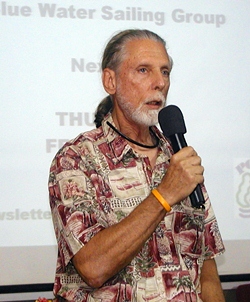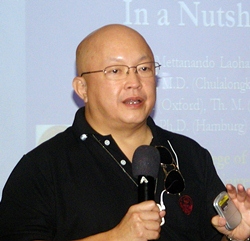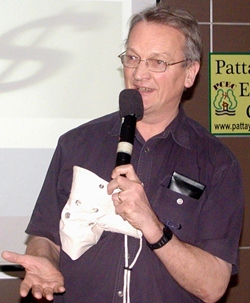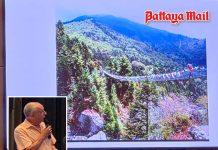The venerable Dr. Nano (formerly Dr. Mettanando Bhikkhu) says that that these are the best and worst of times for Buddhism in Thailand. Best – because Buddhism has more prestige now than ever before. Worst – because the practice of spirituality has declined, and there is too much concern for money.
Dr. Mano was speaking at the Sunday, February 24 meeting of the Pattaya City Expats Club. Dr. Mano is a former Buddhist monk. He teaches Buddhism at the Assumption University and Center for Thai Studies, Chulalongkorn University and serves as a member of the Ethics Committee of the Faculties of Medicine, Chulalongkorn University and Khon Kaen University.
 PCEC Member Michael introduces long time friend, the venerable Dr. Nano (formerly Dr. Mettanando Bhikkhu) to interested members of Pattaya City Expats Club.
PCEC Member Michael introduces long time friend, the venerable Dr. Nano (formerly Dr. Mettanando Bhikkhu) to interested members of Pattaya City Expats Club.
Dr. Mano described the genesis of Buddhism, a religion that encompasses a variety of traditions, beliefs and practices largely based on teachings attributed to Siddhartha Gautama. Dr. Mano explained that although Gautama is known as “the” Buddha, Buddhists believe that he is actually the fourth Buddha and that there is one more Buddha (“Metteya”) to come (a belief similar to the belief of a messiah in other religions).
Dr. Mano explained that “Buddha” is a title, not a name, and that it means “the awakened one” in Sanskrit and Pali. The Buddha lived and taught in the eastern part of the Indian subcontinent between the 6th and 4th centuries BCE. Dr. Mano said that under the Buddhist calendar, Year 1 is the year after the death of the Buddha.
Most scholars agree that there are two major branches of Buddhism: Theravada (meaning the “school of the elders”) and Mahayana (meaning the “great vehicle”). Theravada has a widespread following in Sri Lanka and Southeast Asia. Mahayana is found throughout East Asia. Some scholars also recognise Vajrayana – practiced mainly in Tibet and Mongolia, and adjacent parts of China and Russia as a third branch, while others classify it as a part of Mahayana.
In Theravada countries, Dr. Mano said, Buddhist tradition believes that the Buddha was born, enlightened and passed away on the same day, the full moon day of May. There is an annual festival commemorating this called Visakha Bucha Day. Buddhists do not believe that there is a supreme creator (God), but they do believe that there is an afterlife. They also believe in heaven and hell, although the concept is a little different than in the Christian and Jewish religions. Buddhists believe that they live in “moral universe” where the good are rewarded, and the evil are punished. In Buddhism, the karma of intention counts as most significant; and monks are a “field of merit” from which people can obtain a great amount of merit.
The three main Buddhist principles are: (1) avoidance of all evil; (2) perfection of all goodness; and (3) purification of the mind.
 Dr. Mano explained that “Buddha” is a title, not a name, and that it means “the awakened one” in Sanskrit and Pali. The Buddha lived and taught in the eastern part of the Indian subcontinent between the 6th and 4th centuries BCE. Dr. Mano said that under the Buddhist calendar, Year 1 is the year after the death of the Buddha.
Dr. Mano explained that “Buddha” is a title, not a name, and that it means “the awakened one” in Sanskrit and Pali. The Buddha lived and taught in the eastern part of the Indian subcontinent between the 6th and 4th centuries BCE. Dr. Mano said that under the Buddhist calendar, Year 1 is the year after the death of the Buddha.
Dr. Mano provided an explanation of the intricacies of the Buddhist hell, which has many parts. Dr. Mano said that the Buddhism practiced in Thailand is different from the Buddhism in other countries in Southeast Asia. Further, that 93% of the Thai population is Buddhist. He said that about half of Thai men spend some time ordained as a monk and that more than nine in 10 monks are ordained for less than one year. Dr. Mano explained that most Thai men are ordained because they want to show their gratitude for the milk provided by their mothers. When leaving the monkshood, they are honoured as “pundits” (educated people). Dr. Mano said that a monk follows 227 rules which govern all aspects of life.
Dr. Mano discussed the story of Vessandorn Chadok (or Vesantara) which, he said, is the most popular story in Thailand about the life of the Buddha. He said that in the last part of the rainy season each year, each temple organises a story-telling festival during which the tale of Vesantara is recited. He explained that Buddhists in Thailand, Myanmar and Sri Lanka treat local supernaturalism differently. He noted that the majority of Buddhist houses in Thailand have spirit houses, a tradition that pre-dates Buddhism. The owners of the houses are obligated to make some offering to gratify their local spirits. Further, among Theravada countries, Thailand has the strongest amulet cult. Buddha amulets are made of various objects and can be very valuable; some are bought and sold at high prices, even as high as 10 million baht.
 The meeting was pleased to see old friend and member John Lyneham, just returned from an extended period in the UK.
The meeting was pleased to see old friend and member John Lyneham, just returned from an extended period in the UK.
There are nine levels of structure to the organised Buddhist religion in Thailand, officially ruled by one senior monk, the Supreme Patriarch. In addition, there are eight Somdets appointed by the King. They are abbots of famous Buddhist monasteries.
After Dr. Mano answered several questions, Master of Ceremonies Richard Silverberg then provided an update on upcoming events and called on Roy Albiston to conduct the Open Forum where questions are asked and answered about Expat living in Thailand; Pattaya in particular.
For more information about the many activities of the Pattaya City Expats Club, visit their website at www. pattayacityexpatsclub.com.
For more about Dr Mano, visit: http://www.youtube.com/watch?v=4hsMOUB0nuA




